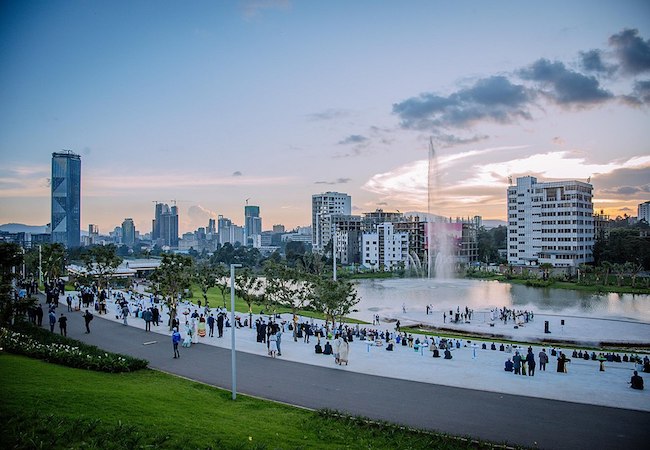
By Tebabu Assefa
Ethiopia has enjoyed rapid growth over the past decade. Fiscal reforms and a relatively swift opening up of the Ethiopian economy by Prime Minister Abiy since 2018 saw GDP rise by 8.4% in 19/20. That reform agenda started to unify & usher Ethiopians, at home and abroad, into a new era of hope and commitment to rebuild Ethiopia. As a result, the country was on a new path away from authoritarianism and poverty, to be a rare case study of democratic and economic success in Africa.
Two years on, Ethiopia has been crippled by the COVID-19 pandemic and a conflict started by the Tigray People’s Liberation Front (TPLF), its special forces and armed militia. The result, as estimated by the African Development Bank, is GDP growth in 2021 will fall to 2%. A level that will mean a reduction in employment opportunities and a rise in the number of Ethiopians living in poverty.
The economic impact on Tigray has been the most dramatic. Millions have been displaced, thousands killed, access to banking is non-existent, communication infrastructure has been destroyed, it is a region in the midst of a humanitarian crisis. As the Tigray People’s Liberation Front continues its insurrection into neighbouring regions the impact there will be the same.
The U.S.-Ethiopia diplomatic relationship has seen positive economic benefits for both countries and more than a million Ethiopians make America their home. I am one of those. I moved to the U.S. in 1981 with pretty much nothing but hope and ambition. The U.S. has provided me the opportunity to develop Blessed Coffee, the country’s second Benefit Corporation and the first prototype of the Benefit Corporation Africa Initiative (BCAI), a pioneering socially responsible business model & trade geared towards development in coffee growing regions in Ethiopia as well as in the U.S. where the coffee is sold.
I know first-hand the importance of economic ties between Ethiopia and the United States. And in all of this, the African Growth and Opportunity Act (AGOA) is one of the most powerful tools we have, offering duty free benefits to African nations. Ethiopia has enjoyed these benefits since 2000 and AGOA is responsible for providing economic empowerment to millions of Ethiopians. I made the point strongly to the Obama administration, when I was awarded a ‘Champion of Change’, that the U.S. should continue to enhance AGOA, bringing in more countries and exploring innovative ways of developing more industries.
This is why I am deeply concerned to hear that the U.S. Government is reviewing Ethiopia’s eligibility for AGOA due to the ongoing conflict and aggressive lobbying from the TPLF. For Ethiopia to be delisted in 2022 would be devastating.
The Biden Administration would be making an overt decision to impoverish hundreds of thousands of Ethiopians and in turn, fuel anti-Western sentiment. It would open the door for China, Russia, Iran and others, as well as risk completely destabilising the Horn of Africa.
COVID-19, conflict, and delisting from AGOA in the space of two years is endgame territory for Ethiopia. Despite the ongoing conflict, I and others, including the US Africa Chamber of Commerce are confident Ethiopia conforms to AGOA eligibility requirements. Since the current government came into office, they have taken significant strides in free market reforms, expanding political freedoms, anti-corruption efforts and more. Trade and investment sectors are still expanding, albeit more slowly than previous years, and Ethiopia still has a higher GDP in U.S. Dollars (according to the IMF) than 35 of the 39 AGOA eligible countries.
The TPLF is very clearly trying to politicize AGOA in service of their own interests, not those of Ethiopia or the United States. Delisting the country now would imperil not only anti-poverty and economic development efforts but would also severely damage U.S. interests in Africa.
My ultimate goal is to present a model that inspires U.S.-Africa Immigrants, estimated to be close to 5 million (with 2nd & 3rd generation). It is a highly motivated economic force with massive purchasing and investment power that can be channelled to redefine U.S.-Africa trade. It is a natural ally to support the much-aspired vision of transitioning the aid-based African economic relationship with the world, to a trade-based one that works for the mutual benefit of all partners.
The final decision on AGOA ultimately lies with President Biden and I, along with the 1 million other members of the America-Ethiopian diaspora, as well as the 5 million U.S.-Africa Immigrant (USAI), sincerely hope that common sense prevails.
Tebabu Assefa is the Founder of Blessed Coffee and the US-Africa Diaspora Business Collaboration




